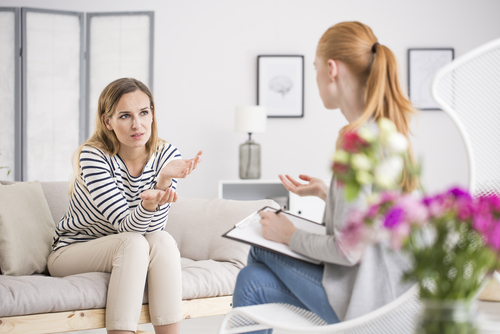It’s one of the most common mental health issues, with 1 in 13 people worldwide affected by anxiety disorders. But help is available. If you’re feeling under stress, you’re not alone.You may recognize the physical symptoms of anxiety: -Sweaty palms -Irregular heart beat -Chest pains -Dizziness -Nausea -Shaking To name a few. Anxiety can also cause a change in the way you think or feel. You may find it hard to concentrate, be more irritable, feel restless or be in a constant state of dread. Over 18% of Americans suffer from anxiety, with women twice as likely to be affected as men. Less than 40% of those with anxiety seek treatment. The good news is that you don’t have to suffer in silence. If you’re anxiety isn’t severe, there are plenty of alternative remedies to help reduce your symptoms.
Consider TMS
Transcranial Magnetic Stimulation (TMS) Therapy safely uses magnetic energy to treat anxiety and depression. This non-surgical treatment works to regulate your emotions. It’s been approved by the FDA since 2008 and has been the subject of many clinical trials. Treatments take about 40 minutes and you can watch TV or listen to music throughout. TMS to treat anxiety involves having an electro magnetic coil placed gently on your scalp. This painlessly sends a magnetic signal to nerve cells in the brain. Treatment sessions are repeated until your symptoms reduce, and you can carry on with the rest of your day afterwards.
Try Exercise
Studies show that exercising can reduce anxiety by producing endorphins, chemicals in your brain that help to lower stress. With just five minutes of aerobic exercise, you can start to feel calmer. Try incorporating one of the following into your routine: -Going for a brisk walk -Running -Cycling -Jogging These all count as aerobic exercises because they encourage your breathing and heart rate to increase. There’s plenty of other forms of exercise you can enjoy too, such as: -Dance -Aerobics -Racket sports like tennis and badminton -Joining a gym, your local health center, or just trying out an exercise class will help you to feel less isolated if your anxiety has been causing you to avoid social situations.
Spend Time in Nature
It’s been proven by research that spending just 20 minutes outside in nature can reduce levels of cortisol, the stress hormone. So if you have a garden or a park near you that helps you feel calmer, then this could be just what the doctor ordered. Other ways of spending time in the great outdoors include: -Helping out on an allotment -Doing volunteer conservation work, -Walking round the block in your lunch break
Use Talk Therapy
Sometimes it can be easier to discuss what’s making you anxious with a trained counsellor or therapist. There are many different types of talking therapies available, but what they have in common is an allocated, safe time and space for you to discuss your anxiety with someone objective. Over time you can then look at your problems from a different perspective by someone who respects you and your opinions.
Ask Your Doctor
If you’ve been struggling with anxiety for at least six months, it’s recommended you talk with your doctor. They will advise you on the next steps to take. If your anxiety is interfering with your daily life, then your doctor may refer you to a psychiatrist who can prescribe you anti-anxiety medication based on their diagnosis. What’s key is to not let anxiety take over your life. Contact the professionals who can offer you the right treatment for your symptoms.

